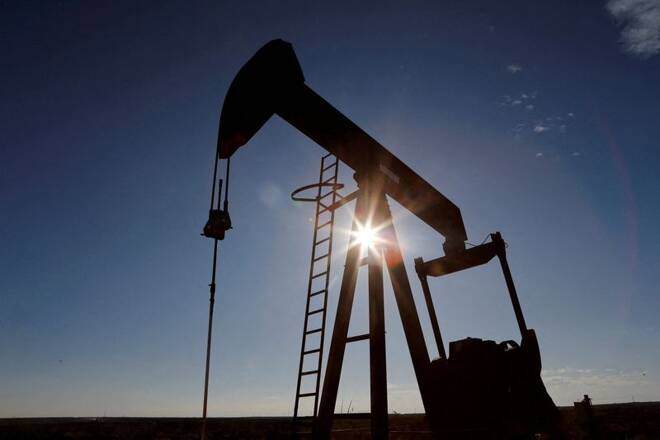Advertisement
Advertisement
Analysis-Private U.S. energy producers tap niche funding as bank lines dry up
By:
By Shankar Ramakrishnan and David French
By Shankar Ramakrishnan and David French
(Reuters) – Private U.S. oil and gas companies are increasingly turning to a niche financing structure that securitizes their production, providing a funding avenue for producers and owners as traditional sources become more expensive or simply dry up.
Known as PDP asset-backed securitizations (ABS), this product takes revenue generated by companies’ proved, developing and producing (PDP) oil and gas operations and uses that cash flow as collateral for a bond that is sold to investors.
With banks pressured by stakeholders to restrict loans to the oil and gas sector over its environmental impact, private energy producers – more reliant on bank lines than listed peers – are able to maintain access to outside finance through this niche product.
“This product resonates with private upstream companies that primarily relied on revolvers from commercial banks, but the availability of such financings has declined,” said Daniel Allison, partner and energy specialist at law firm Sidley Austin LLP.
While the first rated PDP securitization was completed in September 2019 by Raisa Energy, volatile commodity prices and a wave of producer bankruptcies in 2020 stymied its initial application. However, in the last year or so, and with commodity prices hitting multi-year highs in 2022, companies and investors have increasingly taken notice.
More than $3.9 billion of energy sector-related ABS have been sold in public and private markets in 2022, compared to $1.2 billion in 2021, according to Guggenheim Securities. The investment bank helped arrange, among others, a $750 million ABS sold by Jonah Energy in October – currently the largest PDP securitization completed.
One company that has embraced this product is PureWest Energy, Wyoming’s largest natural gas producer, which has sold two such deals: a $365 million note in August, following a $600 million issue in November 2021.
Ty Harrison, chief financial officer at PureWest, explained that a PDP securitization ring-fences oil and natural gas wells so that cash from them goes to servicing the debt. A robust hedging strategy ensures movements in commodity prices do not inhibit the ability to pay investors.
A ring-fenced bond typically carries investment-grade ratings, meaning energy producers, which would otherwise be rated in junk status, can raise money at lower costs: the interest rate is roughly 2 to 3 percentage points cheaper than traditional alternatives like term loans or high-yield bonds, Harrison said.
There are also pricing benefits for investors, most commonly insurance companies, as these PDP ABS pay at least 100-150 basis points more than similar comparable corporate bonds with an investment grade rating, said one investor who did not want to be named.
Growing appeal
As well as financing day-to-day operations, private equity firms that own energy producers are exploring using PDP securitizations as an investor pay-day.
The attraction stems from buyout firms being unable to sell or list companies at a better valuation than merely collecting profits generated from higher commodity prices. A securitization effectively pools the profits and distributes them to investors as an interim reward, allowing owners the time to find another exit during the ABS’ lifespan – typically three to five years.
Terra Energy Partners is one example. It is currently pursuing an ABS deal, after Reuters reported in May that owners Kayne Anderson Capital Advisors and Warburg Pincus were trying to sell the company.
“There are going to be more of these deals going forward as private equity owners look to monetize assets which did not achieve a sale valuation which made sense,” said Pete Bowden, global head of industrial, energy and infrastructure at investment bank Jefferies.
The PDP ABS product is not for everyone: it requires oil and gas wells to be producing at a consistent pace with low decline rates, which are typically older drill sites. New shale wells have intense initial production, as hydrocarbons are released through the hydraulic fracturing process, before quickly tailing off.
Sidley’s Allison said there is plenty of appetite among those whose production is applicable: his firm has been approached by half a dozen companies this year to arrange PDP securitizations, with many more in early-stage talks.
“We will see further growth in ABS issuance next year, with upstream companies increasingly tapping the market as an important component of their capital structure,” said Cory Wishengrad, head of fixed income at Guggenheim Securities.
(Reporting by Shankar Ramakrishnan and David French in New York; Editing by Paul Simao)
About the Author
Reuterscontributor
Reuters, the news and media division of Thomson Reuters, is the world’s largest international multimedia news provider reaching more than one billion people every day. Reuters provides trusted business, financial, national, and international news to professionals via Thomson Reuters desktops, the world's media organizations, and directly to consumers at Reuters.com and via Reuters TV. Learn more about Thomson Reuters products:
Latest news and analysis
Advertisement
